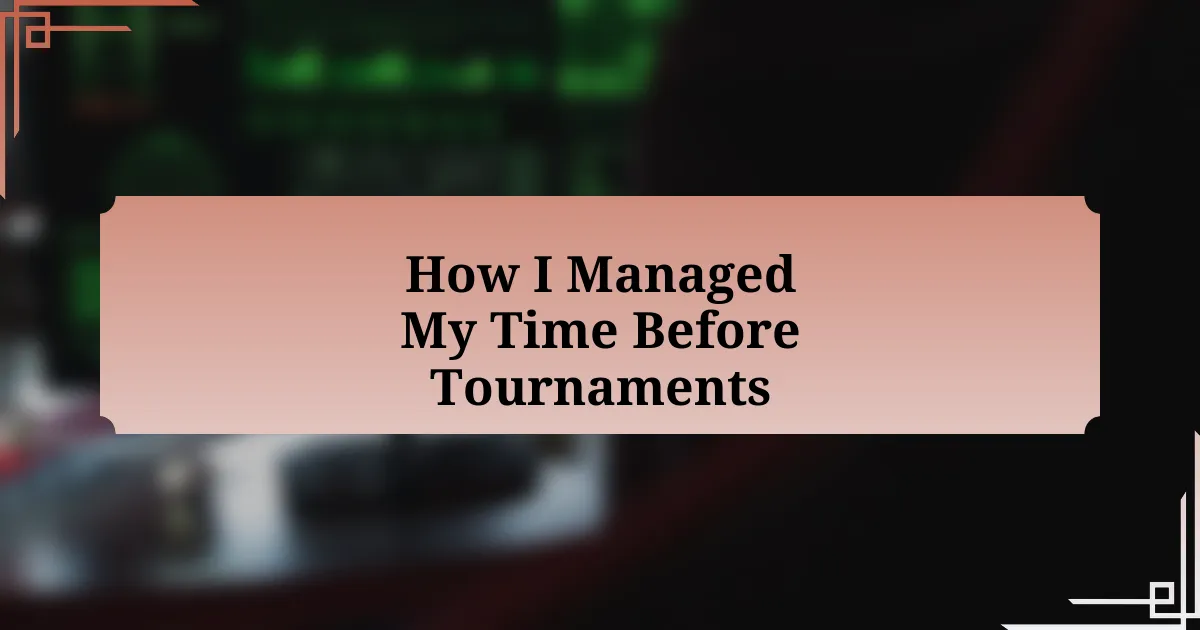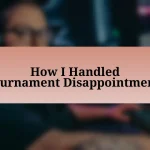Key takeaways:
- Effective time management in gaming enhances performance and well-being, emphasizing the importance of planning, setting boundaries, and incorporating rest.
- Common challenges include distractions, underestimating practice time, and balancing gaming with other responsibilities.
- Strategies like the Pomodoro Technique, setting measurable goals, and prioritizing health can significantly improve training effectiveness.
- Utilizing digital tools like calendars and task management apps helps organize schedules and manage time efficiently for gaming activities.
Author: Evelyn Hartley
Bio: Evelyn Hartley is an award-winning author known for her compelling narratives and richly drawn characters. With a background in psychology and literature, she weaves intricate tales that explore the complexities of human relationships and the intricacies of the human psyche. Her debut novel, “Whispers in the Dark,” was celebrated by critics and readers alike, earning her a dedicated following. Evelyn’s work has been featured in various literary journals and anthologies, and she frequently speaks at writing conferences and workshops. When she’s not writing, she enjoys hiking in the mountains and volunteering at her local animal shelter. She resides in Seattle with her two rescue dogs, Luna and Milo.
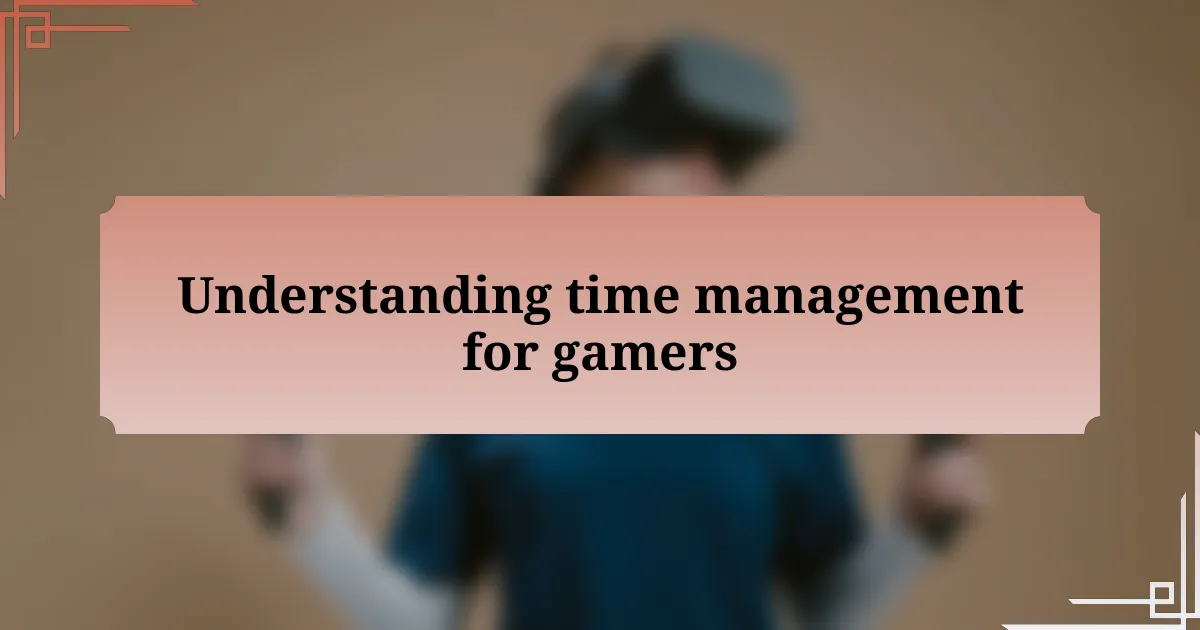
Understanding time management for gamers
Time management in gaming is about more than just allocating hours; it’s an art that shapes not only your performance but also your well-being. I remember a time when I didn’t prioritize my schedule, leading to frantic nights just before a tournament. That’s when I realized the impact of planning – a clear schedule led to a calmer mindset and better gameplay.
Have you ever found yourself lost in a game, realizing days have passed with barely a break? I’ve been there too, diving deep into endless sessions while neglecting basic self-care. Understanding your limits is crucial. I learned that setting specific boundaries, like time windows for practice, can prevent burnout and keep passion alive.
Equally important is recognizing the value of rest. It became evident to me that a refreshed mind performs better than a fatigued one. I started incorporating short breaks in between long gaming sessions, and the improvement was noticeable. How do you balance practice and rest? Finding your unique rhythm in time management not only enhances your skill but also keeps the joy of gaming intact.
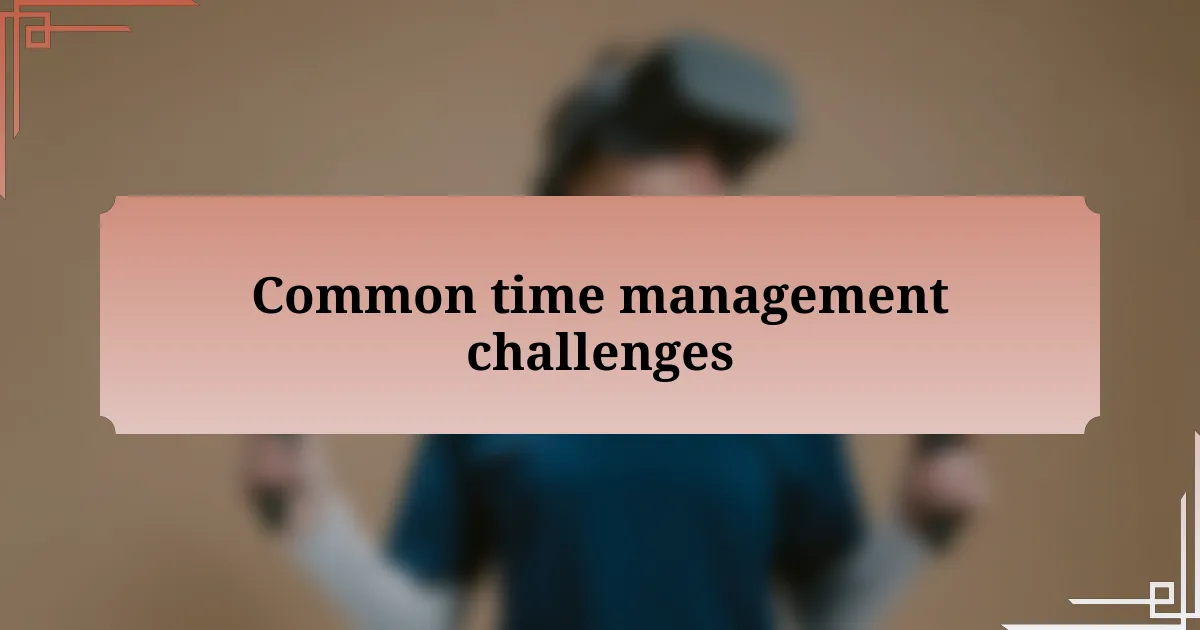
Common time management challenges
When it comes to managing time effectively, many gamers often struggle with distraction. I can recall countless instances where I sat down to practice, only to find myself scrolling through social media or watching streams instead. It’s so easy to lose track of time while being bombarded with notifications and thrilling content, isn’t it?
Another challenge is the tendency to underestimate how much time training actually requires. I’ve had moments where I told myself I’d only practice for an hour, yet before I knew it, several hours had slipped by. This miscalculation often resulted in late nights and a lack of proper sleep, affecting not just my gameplay but my overall health.
Lastly, juggling responsibilities outside of gaming can be daunting. I often found myself torn between tournament preparation and everyday tasks like schoolwork or family obligations. It’s a tough balancing act that requires laser focus and a solid plan. How do you prioritize your commitments? For me, creating a visual schedule helped clarify my responsibilities, allowing for dedicated gaming time without neglecting other important areas of life.
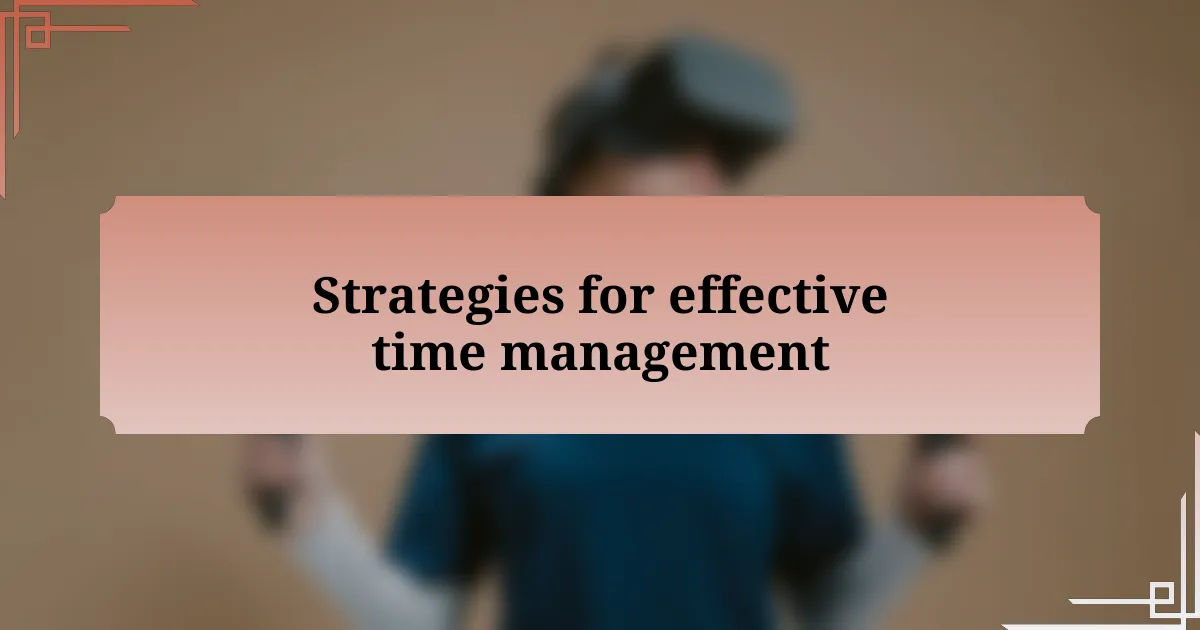
Strategies for effective time management
Effective time management in the lead-up to tournaments is crucial for any dedicated gamer. One strategy I found beneficial was breaking my practice sessions into focused 25-minute blocks, known as the Pomodoro Technique. It may sound simple, but these short bursts of concentrated effort helped me stay engaged while preventing burnout. How often have you felt drained after a long practice? This approach keeps the skills sharp while ensuring that I remain mentally fresh throughout my training.
Additionally, I discovered the importance of setting specific, measurable goals for each practice session. Instead of vague objectives like “improve aim,” I would aim for something concrete, like “hit 80% of my shots in 10 matches.” This clarity not only provided motivation but also made it easier to evaluate my progress. Have you ever felt like you were practicing without purpose? With this strategy, I became more intentional about my time, allowing me to see tangible improvements in my gameplay.
Lastly, I learned about the value of prioritizing my health and well-being during intense gaming periods. Scheduling breaks for physical activity, even just a quick walk, made a noticeable difference in my focus and energy levels. It’s easy to overlook self-care when you’re excited about a tournament, but taking time to recharge often pays off. Have you tried integrating wellness into your routine? For me, it’s become a game-changer in how I approach tournament preparation.
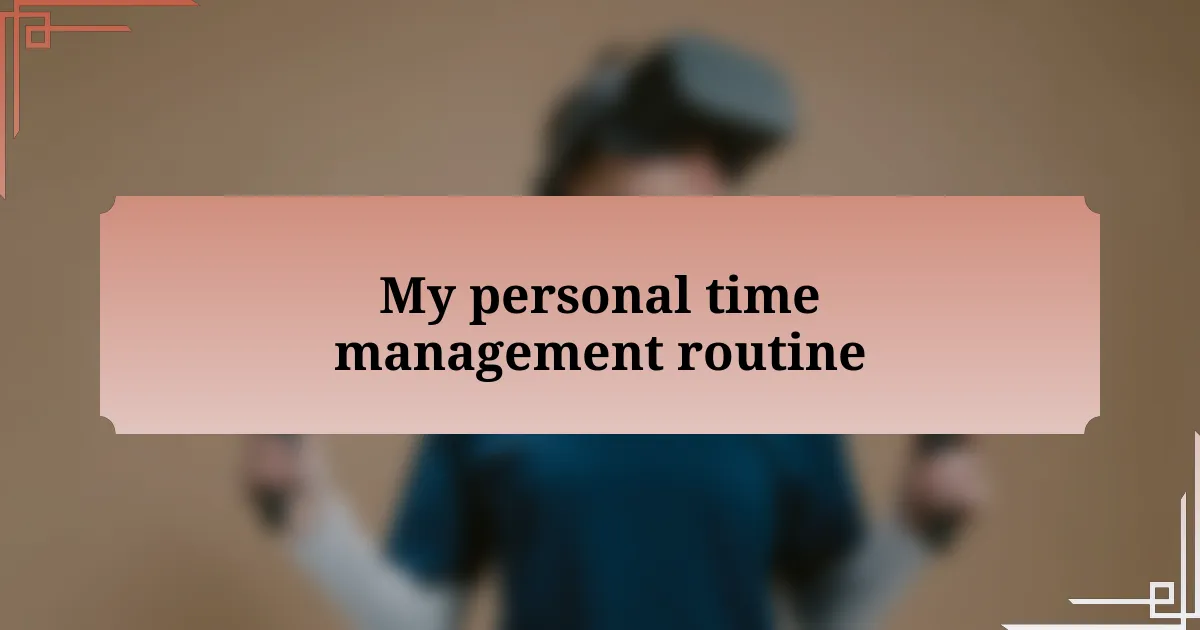
My personal time management routine
My personal time management routine includes a well-structured daily schedule that balances practice, breaks, and time for other obligations. I typically start my day early, dedicating the first few hours to high-focus practice. During these sessions, I often remind myself how important it is to maximize this quiet time; it’s my moment to truly hone my skills without distractions.
I try to keep things fluid, so if I notice I’m losing focus, I allow myself to take a short break or shift to a different activity, like reviewing gameplay footage or watching tutorials. One time, I discovered that shifting gears not only refreshed my mind but also sparked new strategies for my gameplay. Have you ever realized an epiphany right after stepping away from the screen? That’s been a game-changer for me.
Weekends, in particular, are sacred. I dedicate them to intense practice sessions with my teammates, focusing on team dynamics and communication. I’ve found that collaborating with others pushes me to elevate my gameplay. There’s something invigorating about working together towards a common goal—those moments not only sharpen our skills but also strengthen our camaraderie. Don’t you find that having people to share your journey with makes the grind a little easier?
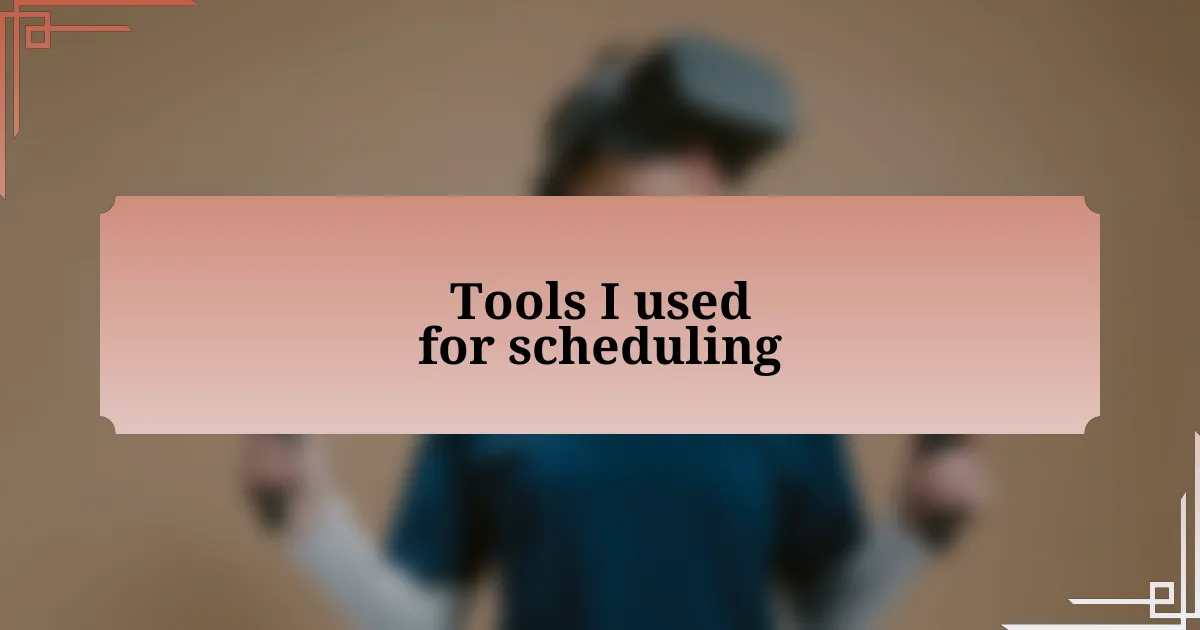
Tools I used for scheduling
When it comes to scheduling, I heavily rely on digital calendars, like Google Calendar. I color-code my events to easily distinguish between practice sessions, tournaments, and personal commitments. The visual aspect really helps me see my week at a glance. Have you ever experienced that feeling of relief when you realize everything is neatly organized? It’s a game-changer.
I also use task management apps, such as Trello, to break down my goals into actionable items. This allows me to prioritize what needs to be done each day and keep track of my progress. I remember one time when I faced a crucial tournament and had so much to prepare; using a visual board helped me allocate my time effectively while managing stress. Don’t you think having a clear plan can eliminate confusion as you prepare for intense gaming sessions?
Additionally, I find value in using timers for focused practice sessions. Tools like the Pomodoro Technique not only help me maintain concentration but also ensure I take essential breaks. It’s surprising how just 25 minutes of dedicated practice followed by a short break can enhance my productivity. Ever tried breaking your work into chunks? It can truly transform your approach to scheduling and improve your performance.

